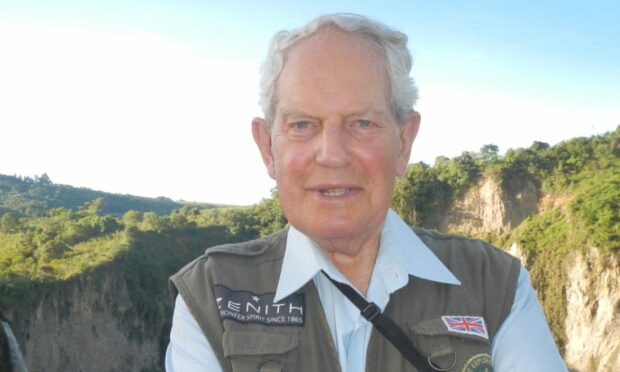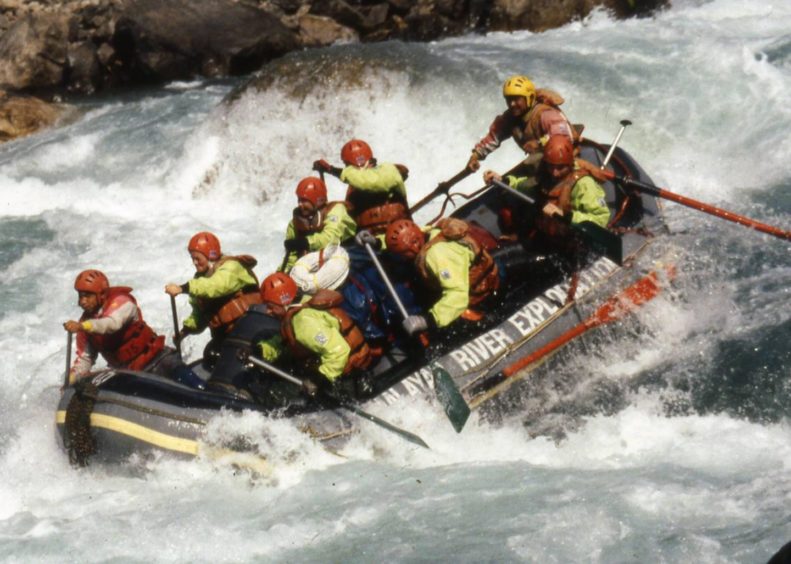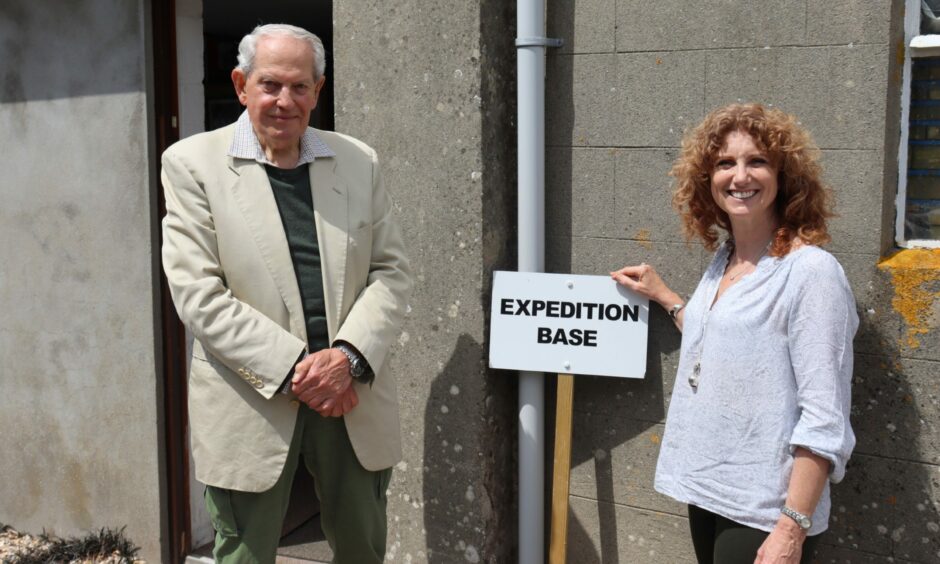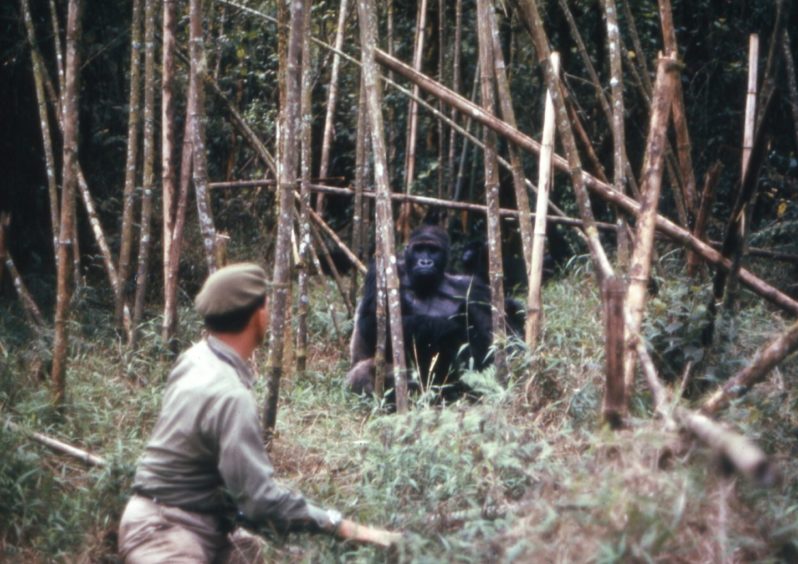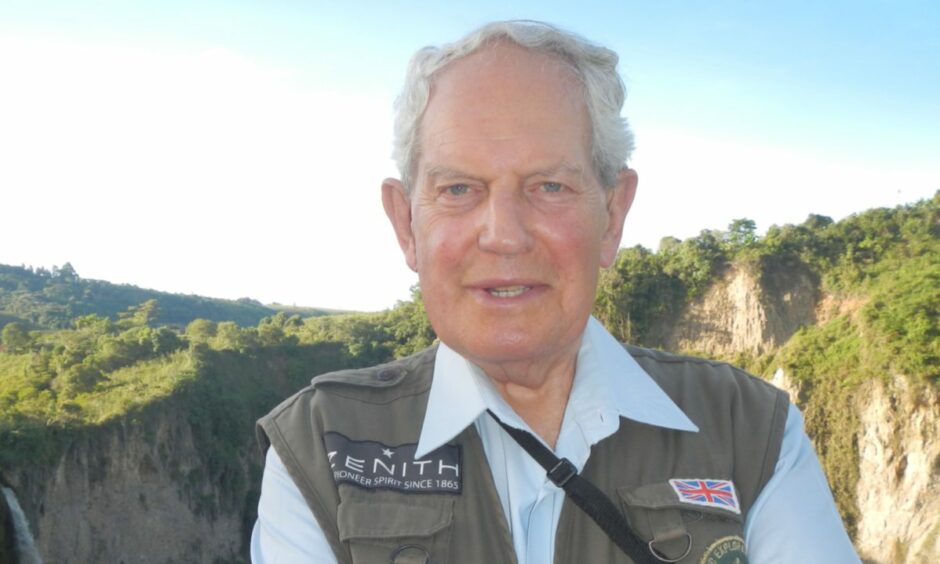Intrepid explorer Colonel John Blashford-Snell talks about his intrepid experiences over the years in a special online event arranged by the Perth-based Royal Scottish Geographical Society. Michael Alexander finds out more.
If you’ve ever wondered what the difference is between an adventurer and an explorer, Colonel John Blashford-Snell might refer you to a 2006 interview when he said: “An adventurer goes in to find out something about themselves, whereas an explorer goes in to find out something about the area or the people or the animals. If you asked me to climb Everest to find some rare medicinal plant, I’d build a scaffold up the side!”
Known for inventing white-water rafting and having organised and led over 100 expeditions, JBS, as he is often known, has built up a reputation as a practical field engineer and become one of the world’s most renowned and highly respected explorers.
It shouldn’t come as a surprise then that when the Perth-based Royal Scottish Geographical Society arranged a soon to be broadcast in-person interview between Blashford-Snell and geographer/broadcaster Dr Vanessa Collingridge, the result is entertaining – and at times unbelievable – as the legendary explorer recounts his intrepid tales.
Stories range from the time he transported a grand piano through the jungle as a gift to the musical Wai Wai tribe in Guyana, to the re-discovery of the Double Nosed Andean Tiger Hound, a run-in with an amorous gorilla, and tasking Operation Drake (now Raleigh International) recruits with catching a pig covered in Vaseline.
Describing the hazards of one particular expedition, the now 84-year-old says: “The one thing they said was, do not go near hippopotamus in the mating season and so I said ‘well when is the mating season?’ and they said ‘well we’re not too sure about that but perhaps when you come back you can tell us.’”
Blue Nile expedition
However, perhaps it’s his infamous descent of the Blue Nile in 1968 that captures the imagination most as it launched his reputation and proved to be the foundation for everything that’s followed.
The expedition came about when Emperor Haile Selassie of Ethiopia invited the British Army to send a team to explore and make the first descent of the infamous Blue Nile.
Captain Blashford-Snell of the Royal Engineers was commissioned to select, train and lead the 60 strong party.
On one occasion, Blashford-Snell’s camp was circled by a couple of bandits armed with Russian rifles. The bandits were quickly captured and marched into camp.
His liaison officer, a man from the Ethiopian Navy, wanted to shoot them, or at the least cut off their ears.
But Blashford-Snell was unusually at a loss to know what to do with them, so he offered them a Mars Bar, which they accepted. He managed to negotiate their release, and gave them a couple of plastic bags as gifts before sending them on their way.
On another night, his team narrowly escaped an ambush by a group of gunmen as they tried to launch their boats.
Chris Bonington, who accompanied the Blue Nile expedition as photo-journalist for the Daily Telegraph magazine, described the area as “the last unconquered hell on earth”, and the Blue Nile as “the Everest of rivers.”
Blashford-Snell, who was awarded the MBE for his leadership, commented: “This caused some mirth at the time, but we were later to discover that it was not so much of an exaggeration after all.’’
Love of conservation
Born in 1936, John Blashford-Snell was educated at Victoria College, Jersey and subsequently entered The Royal Military Academy, Sandhurst.
He served for 37 years in the Army and saw active services in many areas.
His family roots lie in Jersey where his grandfather was a sea captain.
His father was an Army Chaplain and his mother is remembered for her care of animals as well as the people of their parishes.
JBS grew up amongst a menagerie of wounded and orphaned wildlife which generated his own interest in conservation.
He married Judith in 1960 – they have two married daughters and live in Dorset.
The success of the Blue Nile expedition led to even tougher assignments, such as the first vehicle crossing of the complete Darien Gap in 1971/2 and in 1974/5, navigating almost all the 2,700 miles of the great Zaire (now Congo) River.
Both these ventures had strong environmental, medical and scientific objectives and led to JBS being awarded the prestigious RSGS Livingstone medal.
Following the success of the Blue Nile Expedition, however, JBS and his colleagues also wanted to do more for the greater good.
They formed the Scientific Exploration Society – their aim being “to foster and encourage scientific exploration worldwide”.
Inspired by the spirit of Sir Frances Drake’s voyage 400 years earlier, JBS poured his energy into raising funds and selecting a team to run Operation Drake.
From 1978 to 1980, projects were organised for 400 young people from 27 nations working with scientists and servicemen in 16 counties.
Operations were run from the Eye of the Wind, a 150-ton British brigantine which circumnavigated the world providing a floating base and laboratory for their scientific work.
This led to the formation of the Fairbridge Drake Society (now part of the Princes Trust) to help disadvantaged young people and subsequently.
In 1984 JBS launched Operation Raleigh – which earned him the OBE – and by 1992 over 10,000 young men and women from 50 nations had taken part in challenges and global expeditions, returning home as true young pioneers intent on putting something back into their own communities.
Following the inner city urban riots of 1981, JBS set up a special army unit in the Scottish Highlands named The Fort George Volunteers, designed to put inner city youngsters through a series of tough exercises and a positive platform for life.
In 1991 JBS retired from the Army and as Director General of Operation Raleigh.
However, following requests to use his experience to provide similar opportunities for mature people, he has organised and led many science and community aid-based ventures, taking people of all ages to remote areas of the world.
Opportunities
He assists less privileged youngsters and is concerned with the development of opportunities for youth.
He is also a Patron of the Moorlands Community Development in Brixton and assists the Calvert Exmoor Trust in its work with physically handicapped young people.
From 2004 to 2009 JBS directed the Trinity Sailing Foundation appeal that raised funds to give disadvantaged youngsters short sea training courses.
He has founded Operation New World a programme providing field experience for environmental students and is president of the Scientific Exploration Society.
Since 1998 he has led the major Kota Mama expeditions, involving the navigation of South American rivers with traditional reed boats, seeking archaeological sites and providing support for the people, fauna and flora of remote regions.
JBS also helped set up Just a Drop, the World Travel Market charity that provides funding for water projects in the developing world. He is also a supporter of British Army charities.
His interest in unsolved mysteries and wildlife has led him to be elected Life President of the Centre for Fortean Zoology and succeeds the late Dr Bernard Heuvelmans. He has a special affection for voles and is president of the Vole Club.
In more recent years JBS has been concentrating on exploration in little known areas of South America and in 2009 he led another meteorite quest in Bolivian Amazonas.
However, there are also lesser known facts about him.
Loch Ness Monster
Blashford-Snell did some acting work in the early 1960s, and starred on the children’s show Jackanory.
Always fascinated by mysteries, he took part in several expeditions in an attempt to find the Loch Ness monster.
He is a member of the Ghost Club, founded in London in 1862 and widely believed to be the oldest of its kind in the world.
As a child, Blashford-Snell was inspired by stories of Robert Falcon Scott and Ernest Shackleton, which were read to him by his grandmother.
Blashford-Snell is a brand ambassador for Zenith watches. A limited edition of 500, named ‘Zenith, El Primero Blashford’, has been produced in tribute to him.
On his mother’s side, Blashford-Snell can count Louis XV, Oliver Cromwell and Judge Jeffreys among his ancestors.
Reflecting on his motivations over the years, he says: “As far as I am concerned, it is curiosity that drives me on.
“I have no particular desire to conquer a peak or to be the first man to complete some particular feat.
“On an expedition I occasionally find myself listening to two internal voices.
“Perhaps they represent two sides of my personality. One complains and moans, urging me to rest, to turn back or take the easy way out. Fortunately, the other is more forceful and able to suggest alternatives when plans fail. This voice tells me to cheer up and keep going.”
*The RSGS online event, ‘An Evening with Colonel John Blashford-Snell’ takes place on Wednesday September 15 at 7.30pm. The recorded interview between JBS and Dr Vanessa Collingridge will be screened followed by a live Q&A session with JBS. Tickets can be purchased via rsgs.org/Events
